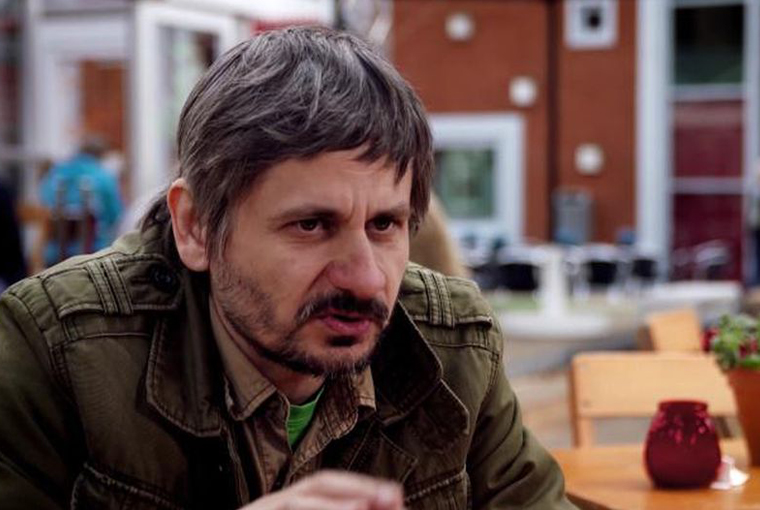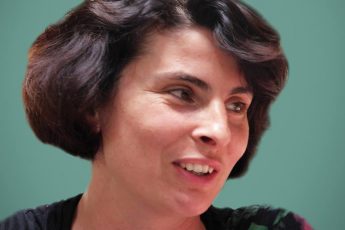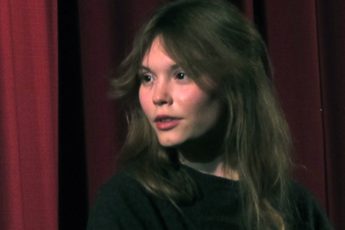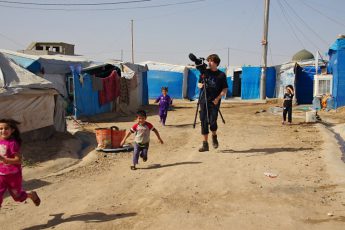
Adrian Sitaru’s second feature “Best Intentions” premiered at the Locarno Film Festival, where it won two Leopards for best director and best actor (Bogdan Dumitrache). We spoke to Sitaru about his protagnoist, the idea for the film, and making autobiographical films…
How did the idea for “Best Intentions” come about?
The film is very autobiographical. Most of what happens in the film is based on something that happened to me and my mother in the summer of 2007. At the time, I had just finished shooting Hooked. When I met with my producers, I talked to them about making this experience with my mother into a film, and they liked the idea. I developed the treatment, and then we started working on the script. Of course I changed some things, but the characters in the film are mostly based on reality.
How would you describe Alex’ problem?
He is a bit neurotic and childish, and something of a control freak. And even if he is not a stupid person, the way he acts under pressure is definitely naïve. I think that human behavior in general is guided by some sort of naivety. Of course, it is not just about Alex, but also about all the people surrounding the mother. Even if everyone seems to have the best intentions, intentions are sometimes not enough. Probably, I myself am more of a pessimistic person than an optimistic one, and I tend to expect the worst-case scenario.
Do you think that this paranoia is typical for a generation?
No, I think it is just a representation of human behavior. However, when I talked to my script consultant who is a professional in the field, I realized that this condition might be more typical of men than women, since men are not as used to having to take care of others. I think that this makes us more childish than women in a way.
Is there a justification for Alex’ worries? Is his paranoia founded on reality?
Yes, I think that it is understandable that he wants the best for his mother. This has nothing to do with Romania. Maybe if you lived in France or in the US, the Swiss health care system would seem better to you. Of course, you always want the best doctors that you can have. An Alex from France would have acted in the same way, even if the standards would be higher. To me, it is almost too strong to use the word paranoia. There are simply all these things building up his anxiety, but paranoia seems exaggerated.
Both of your features seem to focus on the notion of subjectivity – what does it mean to you?
In the case of Hooked, I decided to make the film as subjective because of the script. Since I wanted to tell the story from the perspective of three characters, I decided to intercut. This technique is closer to reality, and, who knows, maybe it is even the future of cinema. I like the idea of putting the viewer into the action, I think it made my film more interesting. Hooked had a very low budget though, which means that we had considerable technical obstructions. For Best Intentions, I knew I would use POV again, but I wanted to make the shots more smooth and realistic. On the other hand, when writing the script, I tried to rethink the story from the perspective of the other characters and be less subjective. So I had this idea of never showing the film from Alex’ perspective, but always from an observational 3rd perspective. Another thing underlying the story is some sort of mysticism. I am not at all a religious person, but after shooting Hooked and the episoed with my mother I isolated myself from other people and grew very lonely. I went back to my hometown and worked on the story all by myself. When I thought about the story with my mother and all the mistakes I had made, it almost seemed as if there was a third person with us at the time. I am not suggesting an angel or anything, but something was there. That is why in the scenes at the beginning and end of the film where Alex is alone, I also tried to make it some sort of POV shot. The camera movement is different than the classical POV shot, but it’s still as if they were shot from somebody else’s perspective. The viewer should decide for himself who or what that third person is.
Do you think it is risky to be this autobiographical and subjective?
Of course, but I felt that the most fair way to tell the story was in this subjective manner.
What about the rabbit? Was it intended to detach the film from reality, the rabbit almost being a surrealist gimmick?
A lot of the patients in the film were inspired by the people who were in the hospital with my mother. One of them had an injury on the face, and I thought that the rabbit mask would bring in a weird element into the film. After Razvan Radulescu saw the film, he said that he didn’t like the film because he thought it was too realistic, because that is the kind of thing that happens in Romanian hospitals. It is not necessarily a surrealist effect that I was trying to achieve. I think I see surrealist elements in our everyday reality, and there are elements in my first feature, too, that could be seen as surrealist. I think that the supposed surrealist moments in Hooked and Best Intentions actually make the film more realistic. Indeed, in the course of the film when the mother gets better and better, Alex remains doubtful, but how can you know that she is really doing better?
Adrian Titieni had a lead role in Hooked as well as your shorts Waves and “The Cage”. Did you consider giving him the main role in Best Intentions, too?
I tried to match the age of the actors with the age of me and my mother, so I couldn’t use Adrian.
How did you find Bogdan Dumitrache?
The casting for Best Intentions was very long. It was hard to find both the mother and Alex, maybe I was being too subjective. I worked with Bogdan on another project, and I liked him very much. He matches my behavior and personality in many ways, and so I gave him the role. It was also Bogdan who suggested Natasa Saab for the role of the mother.
Where do you see yourself in the light of the discussion of the New Wave?
I have told everyone who asked me about the New Wave that it is very difficult for me to say where Romanian cinema stands, and where it is going. I feel like that is something upon critics to decide. With time, the answer will come. It is not too important to me. I think we are all trying to make the best films that we can.
Do you have a project coming up?
I am already rehearsing for my next project, which is called Domestic. I had picked up the project in 2007 and have been developing it parallel to Best Intentions. We got some money from the Romanian film fund, and are going to start shooting in November.
Thank you for the interview.




Leave a Comment